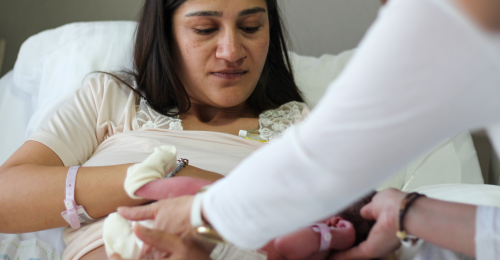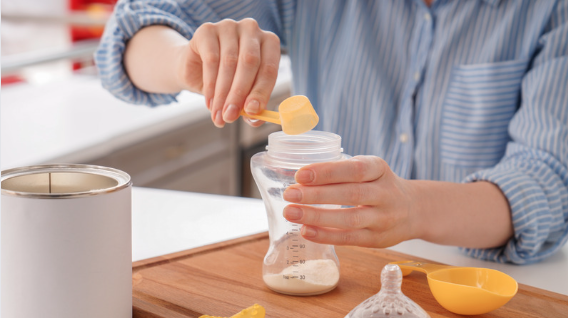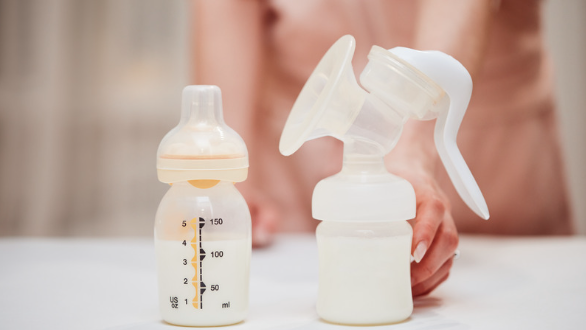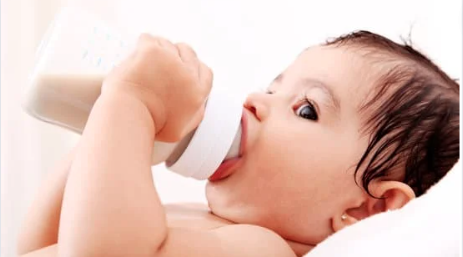Recent Articles

Breastfeeding Without Lactation
What a powerful experience for these two moms to get the bonding moments of both breastfeeding their baby even though neither one of their bodies were making milk. To them, it was their ideal feeding plan and it brought them so much joy. This story teaches us that roadblocks as major as breasts that aren't lactating don't have to stop you from having the feeding experience that means the most to you.

Breastfeeding With Hepatitis
Out of the many blood tests pregnant women receive, screening for hepatitis will be one of them. This is because a woman that is infected with hepatitis may pass the viral infection to her baby during the childbirth process. Hepatitis is a liver infection that is primarily transmitted through blood exposure which can easily occur during both vaginal and cesarean births. Hepatitis A and C are considered curable and people with hepatitis B usually clear the infection on their own after a few months, but some develop a chronic case and may test positive for a lifetime.

Traveling as a Breastfeeding Mother
The thought of long hours in planes, trains, and automobiles while in the midst of your breastfeeding journey can be a daunting one! From how to keep your milk cool, TSA restrictions, and the sometimes confusing list of storage guidelines to the thought of being away from your typical routine and supplies (like a refrigerator!) is enough to make some mothers shy away from travel. The good news is that there are protocols in place to protect you as a breastfeeding mother on the go, and with the right plan in place, travel is still feasible.

A Guide To Pumping
The life of any breastfeeding mom usually involves pumping at some point, whether creating a freezer stash for emergencies, providing milk when the baby is not with her, or simply so other family members can take on some feedings by bottle. This topic can feel confusing and complicated, so we have broken down some of the most common questions that arise.

Why Some Moms Don’t Breastfeed
It’s no secret that most moms say that the actual act of breastfeeding is much more challenging than they originally anticipated. According to the CDC, 83% of parents intend to breastfeed their babies when they are born, but only 24% of mothers manage to exclusively breastfeed their babies by the six-month mark.

When Can I Stop Giving Formula To My Baby?
It can be confusing to navigate all the changes your baby quickly goes through in what seems like the blink of an eye! They grow and develop so fast, even when we wish they would stay little, just a tiny bit longer! One of the big milestones they will experience is the transition away from bottles and formula toward regular foods.

How To Maximize Milk Volume When Pumping
Pumping is a part of pretty much every breastfeeding mom's routine, whether that occurs on a daily basis at work, to boost supply, or just to create an emergency stockpile for the freezer. Since our schedules are already busy enough, every mom hopes to be as effective as possible with pumping efforts to get the most bang for her buck! So what are the things we can do to get the most milk volume when pumping?

Lactation Success Story #3: Bottles for Mom’s Mental Health
I often hear mothers think of breastfeeding as the first and primary step in taking care of their child- it establishes a sense of being a good mother or not right off the bat. However, many don’t realize that being a good mother comes from many facets beyond just a feeding plan! If you love, nurture, and care for your baby, you are indeed a good mom, no matter how you choose to feed!

Lactation Success Story #2: Bottle Preference
I recently worked with a mom in the hospital who let me know right off the bat that she wanted to avoid bottles at all costs in the first few weeks. This is a general recommendation that I offer to all my clients since introducing the bottle before breastfeeding is well established can lead to a bottle preference and issues latching at the breast.

Lactation Success Story #1: The 35-Week Twins
I recently worked with a first-time mom who delivered her twin girls at 35 weeks - 5 weeks early! It’s common for twins to come a little early, and sometimes they take a trip to the NICU, but not these girls! They got to stay with mom the entire 4 days they were in the hospital after their c-section delivery.

The Benefits of Hand Expression
One of the most important things that I teach new parents during every single one of my consultations is hand expression. Hand expression refers to the manual removal of colostrum/milk using your hands rather than directly latching your baby or using a pump.

Feeding on Demand
Unfortunately for all the type-A people that love a scheduled plan, babies don’t feed based on a timed schedule but instead need to be fed on demand. That means they may want to eat every hour for a while and then space out feedings to every 4 hours at other times. The recommendation is that you feed your baby whenever they indicate that they are hungry.

RSV Infection in Infants
Respiratory syncytial virus (RSV) rates are rampant this year, leaving many parents concerned about their babies. RSV is a respiratory virus (like the common cold or covid-19) that can infect people of any age. Still, those with compromised immune systems and infants under 6 months of age are at the highest risk of having severe, even potentially life-threatening cases.

Engorgement and Why it Happens
This is probably a term you have heard before, but what does engorgement really mean? Engorgement is defined as breast pain, firmness, and swelling that is usually uncomfortable. While it can happen at any time throughout a lactation journey, it most commonly occurs with the onset of mature milk production or if the breasts go too long without emptying.

Dysphoric Milk Ejection Reflex (D-MER)
D-MER is associated with brief feelings of intense dread, sadness, depression, hopelessness, and anxiety that occurs only during the letdown phase (the initial 30-90 seconds of milk ejection) and quickly resolve. Unlike postpartum depression, these feelings are fleeting and do not persist throughout the duration of the breastfeeding session or between feedings.

The Benefits of Breastfeeding for Moms
While the benefits of breast milk for babies are becoming well-known around the world (they do call it liquid gold for a reason), there are also many amazing advantages for moms themselves! All the good antibodies and enzymes in breast milk help protect babies from a wide variety of illnesses and diseases, but the act of breastfeeding itself also reduces the risk of severe disorders for mothers, including some cancers!

Nipple and Breast Pain from Vasospasm
Vasospasm occurs when blood vessels contract abnormally, resulting in impaired blood circulation, which can be quite painful. It often presents with color changes of the nipple, such as blanching (turning white) or purple, along with sharp, shooting pain in the nipple, breast, or sometimes both. It is often caused by an incorrect latch cutting off circulation to the nipple but can also result from pre-existing disorders.

Cesarean Birth and Breastfeeding
Whether it be a planned or emergency c-section, it’s normal that the anticipation of surgery can cause fear or worry. I often have moms ask if their delivery method will affect the baby’s breastfeeding ability. While there can be a few added hurdles to breastfeeding when a baby is born by c-section, these are usually short-lived, and most babies go on to breastfeed without any issue.

Can I Diet While Breastfeeding?
While breastfeeding can help you lose weight due to the calorie demand required to make milk, some moms wonder if it's safe to diet while nursing. As a lactation consultant, I recommend that my clients try to intake extra calories while breastfeeding; however, there are some instances where moms can diet safely without affecting breast milk quantity or quality.

Switching from Breastfeeding to Formula Feeding
When doing their research and considering how they would like to feed their newborn, most parents set out with the goal of providing breast milk to their baby. In fact, 83% of babies are breastfed at some point- but that number drops to just 25% being exclusively breastfed at six months of age. Many mothers then have to switch their babies to formula. Read on to learn how to make the transition.

